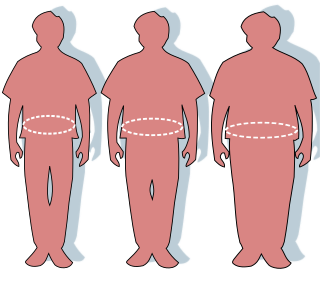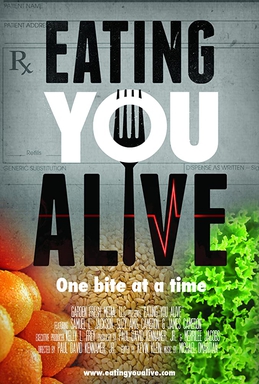Dieting is the practice of eating food in a regulated way to decrease, maintain, or increase body weight, or to prevent and treat diseases such as diabetes and obesity. As weight loss depends on calorie intake, different kinds of calorie-reduced diets, such as those emphasising particular macronutrients, have been shown to be no more effective than one another. As weight regain is common, diet success is best predicted by long-term adherence. Regardless, the outcome of a diet can vary widely depending on the individual.

Obesity is a medical condition, sometimes considered a disease, in which excess body fat has accumulated to such an extent that it can potentially have negative effects on health. People are classified as obese when their body mass index (BMI)—a person's weight divided by the square of the person's height—is over 30 kg/m2; the range 25–30 kg/m2 is defined as overweight. Some East Asian countries use lower values to calculate obesity. Obesity is a major cause of disability and is correlated with various diseases and conditions, particularly cardiovascular diseases, type 2 diabetes, obstructive sleep apnea, certain types of cancer, and osteoarthritis.

"Junk food" is a term used to describe food that is high in calories from macronutrients such as sugar and/or fat, and possibly sodium, making it hyperpalatable, but with insufficient dietary fiber, protein, or micronutrients such as vitamins and minerals. It is also known as HFSS food. The term junk food is a pejorative dating back to the 1950s. Many variations of junk food can be easily found in most supermarkets and fast food restaurants. Due to easy accessibility, commercially-oriented packaging, and often-low prices, people are most likely to consume it.

Fast Food Nation: The Dark Side of the All-American Meal is a 2001 book by Eric Schlosser. First serialized by Rolling Stone in 1999, the book has drawn comparisons to Upton Sinclair's 1906 muckraking novel The Jungle. The book was adapted into a 2006 film of the same name, directed by Richard Linklater.
Fasting is the abstention from eating and sometimes drinking. From a purely physiological context, "fasting" may refer to the metabolic status of a person who has not eaten overnight, or to the metabolic state achieved after complete digestion and absorption of a meal. Metabolic changes in the fasting state begin after absorption of a meal.

Fast food is a type of mass-produced food designed for commercial resale, with a strong priority placed on speed of service. It is a commercial term, limited to food sold in a restaurant or store with frozen, preheated or precooked ingredients and served in packaging for take-out/takeaway. Fast food was created as a commercial strategy to accommodate large numbers of busy commuters, travelers and wage workers. In 2018, the fast food industry was worth an estimated $570 billion globally.

A fad diet is a diet that is popular, generally only for a short time, similar to fads in fashion, without being a standard scientific dietary recommendation, and often making unreasonable claims for fast weight loss or health improvements; as such it is often considered a type of pseudoscientific diet. Fad diets are usually not supported by clinical research and their health recommendations are not peer-reviewed, thus they often make unsubstantiated statements about health and disease.

A very-low-calorie diet (VLCD), also known as semistarvation diet and crash diet, is a type of diet with very or extremely low daily food energy consumption. VLCDs are defined as a diet of 800 kilocalories (3,300 kJ) per day or less. Modern medically supervised VLCDs use total meal replacements, with regulated formulations in Europe and Canada which contain the recommended daily requirements for vitamins, minerals, trace elements, fatty acids, protein and electrolyte balance. Carbohydrates may be entirely absent, or substituted for a portion of the protein; this choice has important metabolic effects. Medically supervised VLCDs have specific therapeutic applications for rapid weight loss, such as in morbid obesity or before a bariatric surgery, using formulated, nutritionally complete liquid meals containing 800 kilocalories or less per day for a maximum of 12 weeks.

The Western pattern diet is a modern dietary pattern that is generally characterized by high intakes of pre-packaged foods, refined grains, red meat, processed meat, high-sugar drinks, candy and sweets, fried foods, industrially produced animal products, butter and other high-fat dairy products, eggs, potatoes, corn, and low intakes of fruits, vegetables, whole grains, pasture-raised animal products, fish, nuts, and seeds.

The sociology of food is the study of food as it relates to the history, progression, and future development of society, encompassing its production, preparation, consumption, and distribution, its medical, ritual, spiritual, ethical and cultural applications, and related environmental and labor issues.
Intermittent fasting is any of various meal timing schedules that cycle between voluntary fasting and non-fasting over a given period. Methods of intermittent fasting include alternate-day fasting, periodic fasting, such as the 5:2 diet, and daily time-restricted eating.

Obesity in Greece is a growing health concern with health officials stating that it is one of the leading causes of preventable deaths in Greece.

Weight management refers to behaviors, techniques, and physiological processes that contribute to a person's ability to attain and maintain a healthy weight. Most weight management techniques encompass long-term lifestyle strategies that promote healthy eating and daily physical activity. Moreover, weight management involves developing meaningful ways to track weight over time and to identify the ideal body weights for different individuals.

Criticism of fast food includes claims of negative health effects, animal cruelty, cases of worker exploitation, children-targeted marketing and claims of cultural degradation via shifts in people's eating patterns away from traditional foods. Fast food chains have come under fire from consumer groups, such as the Center for Science in the Public Interest, a longtime fast food critic over issues such as caloric content, trans fats and portion sizes. Social scientists have highlighted how the prominence of fast food narratives in popular urban legends suggests that modern consumers have an ambivalent relationship with fast food, particularly in relation to children.
Barry Michael Popkin is an American nutrition and obesity researcher at the Carolina Population Center and the W.R. Kenan Jr. Distinguished Professor of Nutrition at the University of North Carolina at Chapel Hill School of Public Health, where he is the director of the Global Food Research Program. He developed the concept of "nutrition transition". He is the author of over 650 journal articles and a book, The World is Fat, translated into a dozen languages.

Preventive Nutrition is a branch of nutrition science with the goal of preventing, delaying, and/or reducing the impacts of disease and disease-related complications. It is concerned with a high level of personal well-being, disease prevention, and diagnosis of recurring health problems or symptoms of discomfort which are often precursors to health issues. The overweight and obese population numbers have increased over the last 40 years and numerous chronic diseases are associated with obesity. Preventive nutrition may assist in prolonging the onset of non-communicable diseases and may allow adults to experience more "healthy living years." There are various ways of educating the public about preventive nutrition. Information regarding preventive nutrition is often communicated through public health forums, government programs and policies, or nutritional education. For example, in the United States, preventive nutrition is taught to the public through the use of the food pyramid or MyPlate initiatives.
The Immune Power Diet is a pseudoscientific elimination diet promoted by physician Stuart M. Berger (1953–1993). The diet was based on the false idea that many people have hidden food allergies and that by eliminating certain foods and taking dietary supplements the body's immune system would be strengthened.

Carlson Wade was an American alternative health writer who authored many books promoting detoxification, fasting, juicing, megavitamin therapy, natural foods and raw food dieting. He developed a fad diet known as the Enzyme-Catalyst Diet.

Eating You Alive is a 2018 health documentary film about why Americans are suffering from chronic diseases such as cardiovascular disease, diabetes, obesity, autoimmune disease, among other diseases, and whether the outcome can be changed.
Jason Fung is a Canadian nephrologist and functional medicine advocate who promotes a low-carbohydrate high-fat diet and intermittent fasting. Fung disputes the current saturated fat guidelines.














